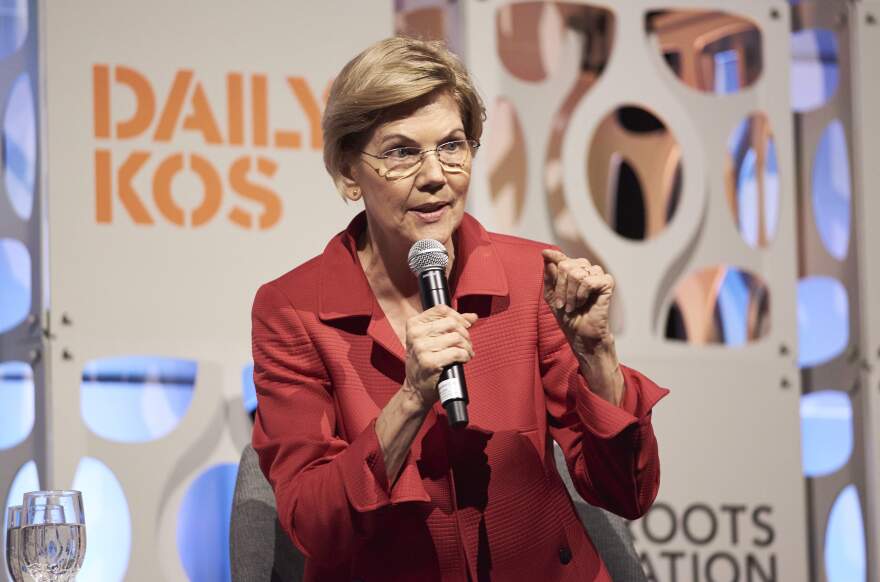Justin Krebs, a campaign director with MoveOn, isn't interested in hearing pundits debate which 2020 Democratic candidate is the most "electable."
"Because exactly four years ago right now there was a messy, crowded primary, with too many candidates, people who were totally unelectable, and Donald Trump was one of them and ended up winning," he pointed out.
And in the same vein, many Democrats thought Barack Obama was unelectable until he started winning primaries in 2008.
Progressives say this word "electability" is being used as a fear tactic to intimidate voters into choosing a moderate, centrist nominee, specifically, former Vice President Joe Biden. But many of the activists who gathered over the weekend at the Netroots Nation conference insisted that's a foolish strategy. Biden, who has consistently led in early polling, is potentially the worst option for the party, they say, warning that Democrats could repeat the mistakes of 2016.
Their main criticism of Biden is two-fold: He's too moderate on economic policy and has a complicated record on criminal justice and race.

There isn't unanimous agreement among progressive activists about who they want as a nominee. Some remain deeply loyal to Vermont Sen. Bernie Sanders for his role in pushing the party leftward. Others say they like the policy plans that Massachusetts Sen. Elizabeth Warren has been rolling out. And yet others say they like what California Sen. Kamala Harris represents — a black woman who could take on President Trump.
But where activists agree is on Biden — they would prefer almost any other 2020 Democrat over him.
While they are purists in many ways, if Biden were to become the nominee, activists at Netroots said, they would vote for him, perhaps begrudgingly. Their fear is that others will not.

"We need to be able to build a coalition of voters that are excited, that are gonna turn out at historic levels, and we can't rely on it just being based on Trump being on the ballot; that won't be enough," said Maria Urbina, national political director for Indivisible. She didn't single Biden out by name, but she said whoever the nominee is, he or she has to energize the Democratic base, specifically young voters and minorities.
Activists also point out that Republicans under a Trump administration have not toned down their rhetoric; why, they ask, should Democrats moderate their message?
Many say that Hillary Clinton tried that strategy in 2016, and it clearly failed. They still ponder — maybe, if Vermont Sen. Bernie Sanders had been the nominee, the Democrats could have won the White House.
Allegra Dengler, a Democratic activist from Westchester County, N.Y., one of nearly 4,000 activists who attended Netroots Nation, says people including her own son didn't like Clinton. They were looking for a change-maker.

Her son voted for Trump in the 2016 election, but she says he would have voted for Sanders, if he had been the Democratic nominee.
Biden doesn't seem like a change-maker to her, either.
"We need to go to the future," she says. "Why is he so popular? I have no idea. He's like a corporate Democrat from Delaware, which is like the corporate headquarters of everything."
Activists say the party needs an inspirational candidate, and moderation doesn't inspire people.

"If you can afford for the world not to change, you take the slow approach," said Yvette Simpson, the CEO of Democracy for America. "If you're a privileged few that can wait for 'Medicarefor All,' then maybe you can be a moderate, but we don't have time for that."
Several major presidential candidates have adopted progressive ideas that were previously on the fringe of the Democratic Party, such as Medicare for All.
But one candidate who has not is Joe Biden. On Monday, he unveiled a health care plan that would build on the Affordable Care Act by expanding Medicaid and creating a more robust public option. It was a clear contrast to the more progressive alternative.
"I understand the appeal of Medicare for All, but folks supporting it should be clear that it means getting rid of Obamacare, and I'm not for that," Biden said in a video.
He warned that overhauling the system would be too risky.
The fight over health care is a proxy for the broader ideological battle in the Democratic Party with Sanders on one end and Biden on the other.

Sanders has long championed a Medicare for All system. And he plans to deliver a speech on Wednesday to "confront the opponents of Medicare for All."
Sanders' supporters feel that Biden's approach is too incremental and antiquated. The goal, progressives say, is not merely to maintain the ACA, but to establish universal health care.
But that's not the goal of most voters, who are more concerned about the cost of health care than the system itself, says Lanae Erickson, senior vice president of social policy and politics at the centrist think tank Third Way.
"It gives a huge window for Donald Trump and Republicans to label Democrats as socialists and have that label stick," said Erickson, who's skeptical of how progressives are framing the debate.
Democrats, she says, have a clear road map to the White House in 2020 — they need to follow what they did in the 2018 midterms.
"The margin for taking back the House came from people who switched their votes, not people who stayed home, so if we are going to win again and beat Donald Trump, we absolutely need to win some folks who are coming over from the other side," Erickson said.
Copyright 2020 NPR. To see more, visit https://www.npr.org. 9(MDAwMTM1NDgzMDEyMzg2MDcwMzJjODJiYQ004))



